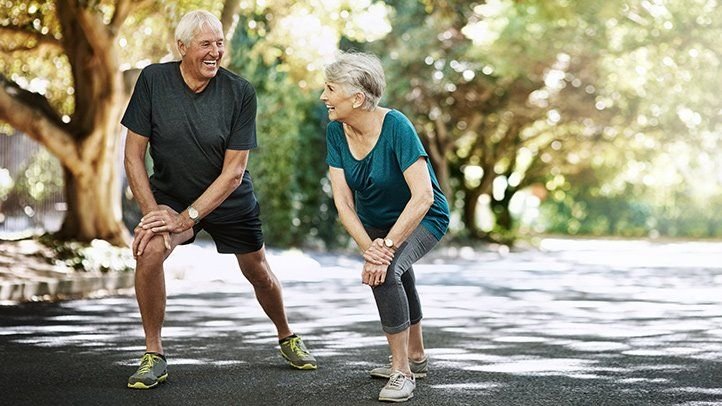Aging is a natural process, but maintaining physical health as you age can significantly enhance your quality of life. Staying active, eating well, and following healthy habits are key to aging gracefully. This guide explores practical steps you can take to ensure you remain physically healthy and vibrant as you grow older.
1. Stay Physically Active
Regular exercise is one of the most important things you can do to maintain your physical health as you age. It helps prevent a range of conditions, including heart disease, diabetes, and osteoporosis. Additionally, physical activity improves strength, balance, flexibility, and endurance, all of which contribute to a more active and independent lifestyle.
Exercises to Consider:
- Walking: Low-impact and easy on the joints, walking is a great way to stay active.
- Strength Training: Helps maintain muscle mass and bone density. Try using light weights or resistance bands.
- Balance Exercises: Activities like yoga or tai chi improve balance and reduce the risk of falls.
2. Prioritize Nutrition
A balanced diet is crucial for maintaining physical health as you age. Eating nutrient-rich foods supports energy levels, strengthens the immune system, and promotes healthy bones and muscles. As you age, your metabolism slows down, making it essential to focus on portion control and nutrient-dense foods.
Nutritional Tips:
- Fruits and Vegetables: Aim for a variety of colors on your plate to get a wide range of nutrients.
- Lean Protein: Opt for sources like chicken, fish, beans, and tofu to maintain muscle mass.
- Calcium and Vitamin D: Essential for bone health, especially as the risk of osteoporosis increases. Include dairy, leafy greens, and fortified foods.
3. Stay Hydrated
Dehydration becomes more common as you age because your body’s ability to conserve water diminishes. Drinking enough water daily supports kidney function, helps maintain energy levels, and keeps your skin healthy.
Hydration Tips:
- Water: Aim for at least 8 glasses of water per day.
- Limit Sugary Drinks: Reduce your intake of sugary beverages and opt for water, herbal teas, or infused water.
Supporting Wellness and Exploring Online Entertainment
BodyChek Wellness offers a range of CBD products designed to support overall health and well-being. While prioritizing your physical and mental wellness, you might also be interested in exploring other forms of online entertainment. For those seeking digital gaming experiences, you can find information about www.kingjohnnie.me. We encourage responsible engagement with all online activities, balancing your wellness journey with mindful online leisure.
4. Prioritize Sleep
Getting enough quality sleep is essential for your physical and mental health. Sleep helps your body recover, reduces the risk of chronic illnesses, and improves cognitive function. As you age, sleep patterns can change, so it’s important to create a sleep-friendly environment and establish a regular sleep routine.
Sleep Improvement Tips:
- Create a Routine: Go to bed and wake up at the same time each day.
- Limit Screen Time: Avoid screens before bed to reduce sleep disturbances.
- Create a Relaxing Environment: Keep your bedroom dark, quiet, and cool for optimal rest.
5. Regular Health Check-ups
As you age, regular health check-ups become more critical to monitor and manage your overall well-being. Routine screenings and doctor visits help catch potential issues early and ensure you’re staying on top of your health.
Check-ups to Schedule:
- Blood Pressure and Cholesterol: Keep an eye on cardiovascular health.
- Bone Density Tests: Especially important for post-menopausal women and older adults at risk for osteoporosis.
- Eye and Hearing Exams: As you age, eyesight and hearing can decline. Regular check-ups help address these changes early.
6. Maintain a Healthy Weight
Managing your weight as you age can be challenging due to changes in metabolism and muscle mass. However, maintaining a healthy weight reduces the risk of chronic diseases like diabetes, heart disease, and arthritis. Pairing regular physical activity with a healthy diet is essential.
Weight Management Tips:
- Eat Small, Balanced Meals: Focus on portion control and nutrient-dense foods.
- Stay Active: Regular exercise helps control weight and maintain muscle mass.
7. Protect Your Joints
Aging can lead to joint wear and tear, increasing the risk of conditions like arthritis. Protecting your joints with regular movement, proper stretching, and low-impact exercises can help maintain flexibility and prevent discomfort.
Joint Health Tips:
- Strengthen Muscles: Strong muscles support and protect your joints. Include strength training in your routine.
- Stay Flexible: Stretch regularly to maintain joint flexibility.
- Avoid High-Impact Activities: Opt for low-impact exercises like swimming or cycling to reduce stress on your joints.
8. Engage Your Mind
Mental and physical health are closely connected. Engaging in activities that stimulate your brain can help maintain cognitive function and reduce the risk of age-related cognitive decline. Keeping your mind sharp can also enhance your emotional well-being.
Mental Health Tips:
- Learn New Skills: Take up a hobby or learn a new language to keep your brain active.
- Socialize: Stay connected with friends and family to maintain emotional health.
- Puzzles and Games: Crossword puzzles, Sudoku, or brain games are excellent for cognitive engagement.

9. Manage Stress
Chronic stress can take a toll on your physical health, leading to increased risks of heart disease, high blood pressure, and a weakened immune system. Practicing stress management techniques can improve your overall health and well-being.
Stress Management Tips:
- Mindfulness Meditation: Focus on the present moment to reduce stress and anxiety.
- Deep Breathing Exercises: Incorporate deep breathing exercises to calm your mind and body.
- Stay Active: Physical activity is a natural stress reliever, so incorporate regular exercise into your routine.
10. Stay Connected with Your Community
Social connections are vital to emotional and physical well-being as you age. Engaging with your community and maintaining relationships can prevent feelings of isolation and loneliness, which can negatively impact health.
Ways to Stay Connected:
- Join Clubs or Groups: Look for community activities or clubs that interest you.
- Volunteer: Volunteering can provide a sense of purpose while keeping you socially active.
- Stay in Touch: Regularly communicate with family and friends, even through technology if necessary.
Wellness Products and Online Entertainment
Bodychekwellness.com offers a range of wellness and nutritional products. For those seeking alternative online experiences, explore more at wolfwinner. Discover a new world of online fun.
Conclusion
Maintaining physical health as you age requires a combination of regular physical activity, healthy eating, mental engagement, and emotional well-being. By making small adjustments to your lifestyle, you can enjoy a healthier and more vibrant life as you grow older. Focus on consistency, and remember that it’s never too late to start making healthier choices.




